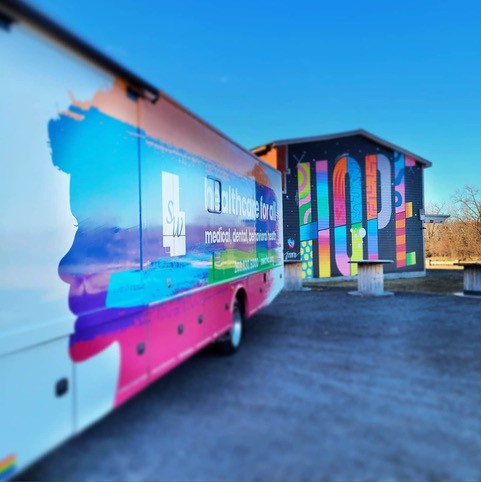
Utilizing existing technologies in new ways can drive high-impact innovation in health care delivery. Hear what Brad Watson, chief revenue officer of Mission Mobile Medical and a Global Health Care Leaders Program participant at Harvard Medical School Corporate Learning, has to say about passion, purpose, and positive change in health care.
Mission Mobile Medical’s goal is to bring health care to vulnerable populations. Tell how us you serve these communities.
There are 75-100 million Americans who lack access to care, many of whom are the most vulnerable among us. Mission Mobile Medical is dedicated to bringing essential health care directly to underserved communities and fostering proactive health engagement. We do this by remanufacturing recreational vehicles to serve as Mobile medical and dental clinics.
Most of our conversations are around the importance of primary care. We focus on engaging individuals who might otherwise remain disengaged from health care services until faced with emergency situations. In addition to primary care, we've expanded our services to address other needs within the community. A significant area of emphasis for us is dental care, recognizing its critical role in overall well-being. We're also involved in specialized imaging services, including mammography, delivered through our unique mobile clinics equipped with state-of-the-art imaging equipment.
What is your role at Mission Mobile Medical?
When I joined Mission Mobile Medical, I brought my experience leading in the home health care and medical staffing space. I support our front of house operations, including sales, marketing, and distributor channels. I also support our emerging mobile health care solutions team that assists communities across the country activate and operate sustainable mobile clinic programs.
We’ve had substantial growth since being born in 2020 during the global pandemic; we transitioned from five individuals in a driveway to a team of 100 employees and now serve patients in 37 states and Canada, with further expansion planned, both organically and through M&A activity.

How do you partner with local health care providers?
In response to the challenges faced by local health care providers, we shifted our approach from being a vehicle manufacturer to a comprehensive mobile health care company. Previously we sold mobile clinics to providers, and have now pivoted toward collaborative partnerships, focusing on technical assistance. These discussions aim to offer extensive support, addressing not just equipment sales but also providing operational expertise. This shift allows us to work closely with Federally Qualified Health Centers (FQHCs), and essential safety net providers nationwide, serving individuals with Medicaid, those lacking insurance, and those with commercial insurance.
Who are your typical patients?
Many of our patients can’t afford to take a day off work to drive an hour to a clinic and wait to be seen. Or they don’t have a way to get to the clinic. I have anecdote after anecdote of people who fit this profile. We also do a lot of farm worker programs and a lot of work for the unhoused.
How do patients react to getting care in a recreational vehicle turned medical or dental office?
Initial reactions might range from curiosity to skepticism. However, as the community becomes familiar with the service and realizes no cost is involved, perceptions tend to shift positively over time. Our mobile clinics visit the same locations consistently for the first 90 days to build trust and credibility, for example, we will go to the same church parking lot every Monday.
What are Mission Mobile Medical’s biggest challenges right now?
We're pioneering a unique analog health care delivery approach distinct from prevalent digital initiatives. Our strategy involves parking mobile clinics in specific locations, emphasizing simplicity over digital complexity. Communicating this approach has been challenging, leading us to continue to adjust our stance to better explain what’s possible and the sustainability of a mobile clinic program. The key challenge lies in conveying the cost-effectiveness and efficiency of our model, highlighting the affordability of our mobile exam rooms. We're also working on sustainability, aiming to reduce reliance on grant funding by developing a self-sustaining business model.
You have a front-line view into some of the health equity issues in the United States. What’s your take on how we are doing? What can we do better?
Many of our patients are just trying to make it until tomorrow. From my perspective, the health equity issues in the United States highlight a fundamental misalignment in our health care system's priorities between providing care and the financial incentives. Currently, the system is designed to run people through various tests and services, emphasizing quantity over quality of care. We don’t prioritize the well-being of individuals which contributes to significant health disparities. While there are ongoing efforts, such as value-based care pilots, to realign payment structures and incentivize positive outcomes, there is still much work to be done around social determinants of health.
Where would you like to see Mission Mobile Medical in five years?
There are around 3,200 counties in America. We want to be in each one. Our primary goal is to significantly reduce the number of individuals lacking access to health care, aiming to reduce about half the number of our neighbors that lack access to care. This vision serves as our guiding North Star, driving our daily efforts and actions.
Tell us about your experience as a participant in the Harvard Medical School Global Health Leaders Program. Why did you enroll, and how will it benefit your professional growth and your organization?
Enrolling in the Harvard Medical School Global Health Leaders Program was a deliberate choice driven by my commitment to personal and professional growth. Having always considered myself a salesperson, I transitioned into leadership roles and recognized the importance of continually developing my skills to lead in larger capacities effectively. While confident in my ability to guide a $20 million company, my aspiration to be able to effectively help lead our organization as it scales prompted this investment in self-improvement.
The program has provided invaluable perspectives, particularly through interactions with bright minds of the faculty and the international cohort. The exposure to varied viewpoints, such as in the supply chain simulation, has expanded my understanding. With a focus on raising my leadership lid, my capstone project idea involves addressing health care accessibility by deploying mobile clinics in every county by 2030. I anticipate the faculty and cohort's critical feedback will help refine this model further so that we can successfully implement this ambitious goal.
The Global Health Care Leaders Program (GHLP) is a multi-modular program that gathers leaders in the health care industry to explore and understand the various challenges and opportunities shaping its future. Led by faculty from Harvard Medical School and industry experts, the program addresses the complexities of the rapidly evolving health care landscape. Its goal is to empower global health care leaders with the knowledge and skills needed to apply these insights in their daily work and effectively lead organizational transformations.
Corporate Learning Blog
View the latest stories from our community members and expert partners at the Harvard Medical School Corporate Learning blog.